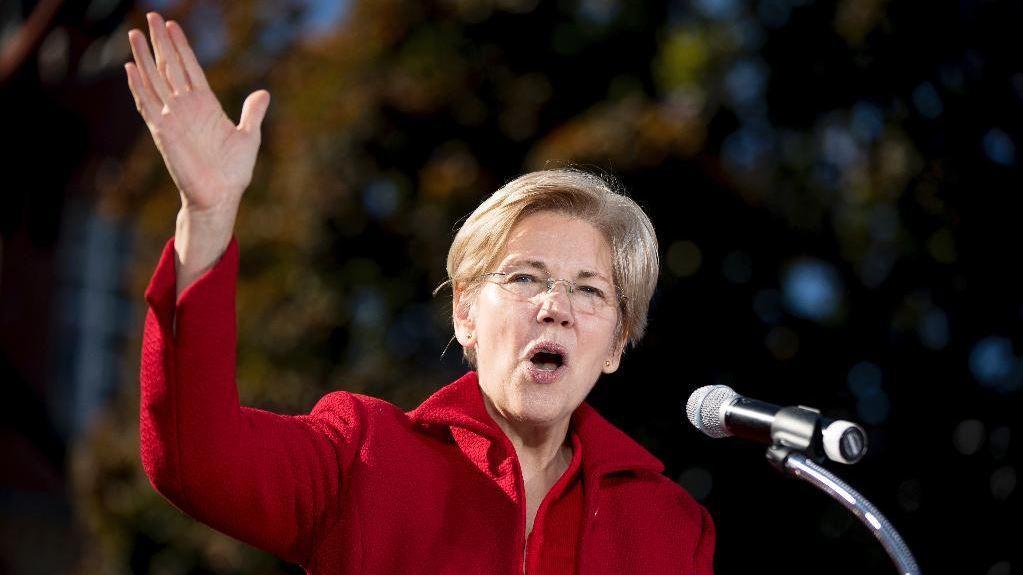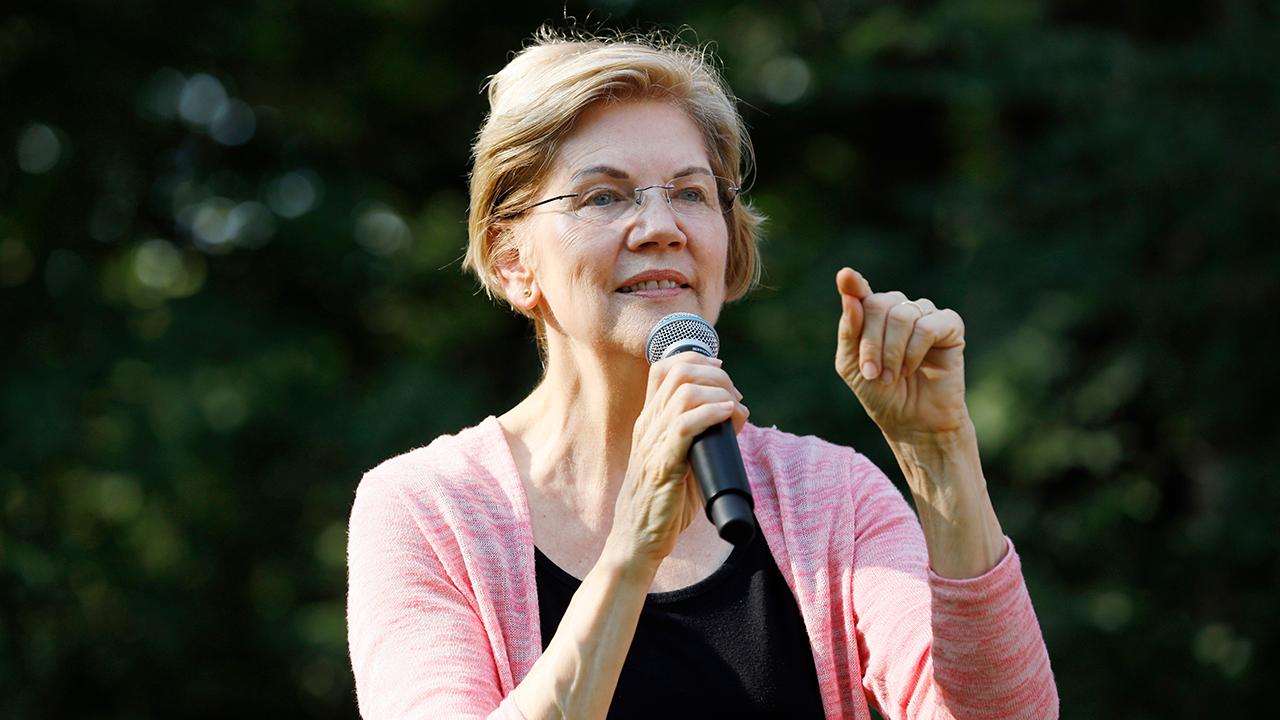Wall Street, Warren relations thaw as she inches closer to front-runner
Sen. Elizabeth Warren built her political career bashing Wall Street as the embodiment of everything that is wrong with American capitalism. Now, as she ascends close to front-runner status in the Democratic race to unseat Donald Trump in 2020, there are signs that this icy relationship with financiers and other corporate honchos is starting to thaw, FOX Business has learned.
In recent weeks, numerous Wall Street Democrats have approached key officials in the Warren camp to gauge whether they — and their money — will be welcome in the Warren coalition if she does become the Democratic nominee for president, according to several Wall Street executives who have spoken with people inside Warren’s inner circle.
The response from Warren’s advisers to Wall Street has been far different than the strident attacks that candidate Warren has made against the financial industry and corporate America in general, these people say. In fact, key Warren people are telling Wall Street executives and other corporate Democrats that the Massachusetts senator will likely moderate her harsh anti-business tone, if she gets the nomination, in order to woo some business support for the General Election. They are also saying there is wiggle room in her recent pledge to limit contributions from financial executives that will allow her campaign to tap these sources for fundraising purposes, these people add.
The modest, albeit behind-the-scenes, detente between some Wall Street Democrats and the Warren camp comes as key officials in her campaign grapple with the realities of competing in a General Election. She will need to raise significant sums of money to be able to run against what will be a well-financed incumbent in President Trump if her momentum continues on the way to securing the Democratic nomination, these people say.
“She has to accept money from the finance business in the general election because if she doesn’t it will be impossible for her to win,” said one senior corporate executive and Democratic Party fundraiser who has met with Warren campaign officials. “Her people told me if she beats Trump she will loosen her restrictions because they know if they don’t, it will disqualify her as the nominee. If she can’t raise enough money, she will lose to Trump easily and she could take the party down with her.”
A press representative for Warren’s campaign didn’t respond to a request for comment.
Of course, Wall Street and the Warren campaign aren’t on friendly terms just yet. She has built a reputation in academia, as a U.S. senator and most recently as a candidate for the Democratic presidential nomination as a staunch critic of what she views as the excesses of Wall Street. Warren has called for a break-up of the big banks in order to prevent another meltdown, like the one that led to the 2008 financial crisis. She’s also advocated for higher taxes on trading of stocks and on the rich to pay for a vast array of new social programs. Similarly, she has railed against the power of big technology companies and called for breaking up these outfits as well.
And this populism, at least on the surface, has seeped into her fundraising. On Oct. 15, Warren appeared to double down on her populist bona fides, by pledging in a post on the website Medium “not to take money from federal lobbyists or PACs of any kind.” In the post, she wrote that she will not take contributions over $200 from fossil fuel or big pharma executives, executives at big tech companies, big banks, private equity firms or hedge funds.
And when I’m the Democratic nominee for president, I’m not going to change a thing in how I run my campaign: No PACs. No federal lobbyists.
Such positions have endeared Warren to the Democratic Party’s progressive base. In recent weeks, she has risen in both national and state polls and appears on the verge of overtaking former Vice President Joe Biden as the party’s front-runner. By focusing on smaller, individual donations, Warren has been able to spin a populist message that has her on the verge of front-runner status.
Records show she has raised $60 million, which puts her near the top of the list of Democratic Party contenders. Bernie Sanders leads by raising $73 million, and her war chest is well above the $36 million raised by the nominal front runner, Joe Biden.
But running a General Election campaign will take much more money — around $1 billion or more to put up a credible fight against Trump. Raising that much money would be an impossible feat, Democratic Party insiders say, if Warren adopts the same fundraising standards in the General Election. Without such cash on hand, Warren could be easily defeated by Trump and her poor showing would hurt Democrats running in House and Senate races as well.
In 2016, the Trump campaign was a shoestring operation that relied on the real estate and reality TV star’s outsize persona to generate massive, free publicity worth hundreds of millions of dollars. Trump approaches the 2020 election with the same personality, but he now has money — and lots of it.
Numerous financial executives have warned about the disastrous economic and market implications of a Warren presidency given her policies of higher taxes, and calls to break up big banks and technology firms.
Indeed, most Wall Street executives are expected to support Trump in the 2020 election, particularly if Warren is the Democratic nominee — and Trump’s fundraising apparatus appears to be benefitting from the far-left tilt of the Democratic Party in general. According to the Washington Post, the Trump campaign has raised more than $700 million so far, which is more than any other candidate at this point in the election.
Trump is expected to raise more than $1.5 billion given the current pace of donations, fundraisers told FOX Business.
GET FOX BUSINESS ON THE GO BY CLICKING HERE
Still, there remains significant pools of support at big banks and among hedge funds for any Democratic nominee, including Warren under the right conditions. Warren’s operatives who have discussed the fundraising landscape with Democratic Wall Street bundlers are said to understand the challenges and are starting to suggest that Warren will moderate her anti-business rhetoric and propose ways around the strict limits she set on Wall Street donations.
They’re telling potential fundraisers that Warren is and will always be a “capitalist at heart,” and that her core message is one of economic equality, according to a person who has met with her team. These advisers are telling fundraisers from the financial business that corporate money can flow to the campaign through entities likes the Democratic National Committee, people with knowledge of the matter say.
And Warren operatives also said the candidate hasn’t totally formalized her promise to put a strict limit on taking money from Wall Street.
"There are numerous ways around her new self-imposed restriction. Should Warren secure the nominations, her campaign could even claim it’s the vice-presidential candidate who is raising the money, not her" said Dan Backer, campaign finance lawyer.
Backer also notes that Super PACs, as well as the Democratic National Committee, can act on Warren’s behalf without her taking any money from them directly. Super PACs may be a particularly useful vehicle for Warren since there are no limitations on how much individuals can donate and it is difficult to trace who gives to these funds. For instance, a Warren super PAC could spend enormous amounts on ads without her being connected to any of the money because candidates cannot directly coordinate with super PACs that support them.
“Money is what drives political campaigns,” Democratic political consultant Hank Sheinkopf told FOX Business. “She can always say what she needs to say now to get nominated and something else when after she gets the nomination. In politics, it is impossible to hold people to their promises. She would be no different.”





















